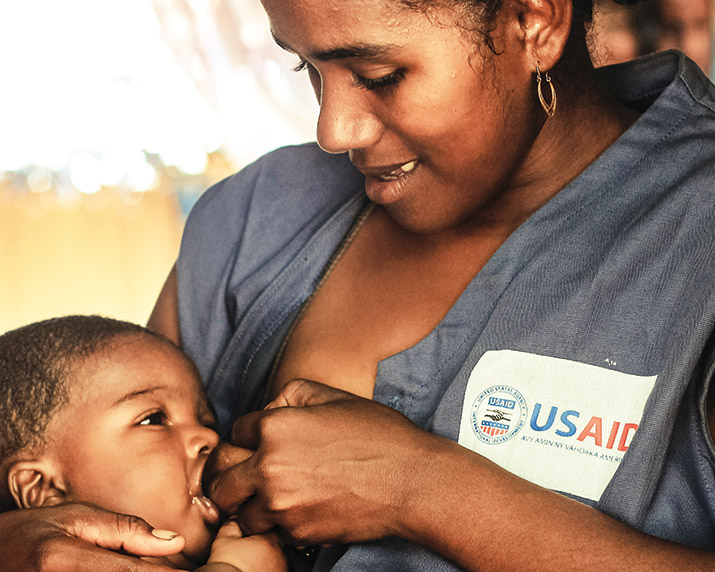Community Health Worker Promotes Exclusive Breastfeeding by Example
Community Health Worker Promotes Exclusive Breastfeeding by Example

Half of children under the age of five in Madagascar are chronically malnourished: 24% suffer from moderate malnutrition and 26% from severe malnutrition, according to the 2012-2013 Millennium Development Goal Survey. Children in rural areas suffer disproportionately because they are often cut off from resources and information, and are typically far from health centers that support family health. Community health volunteers (CHVs) like Grancie Cicie help close the gap.
Cicie serves the village of Ambodilahoaty, located 21 km from the nearest health center, in eastern Vatomandry District. She has a four-month-old boy and is known for her determination in promoting healthy living in the community through her work as a CHV with the USAID Mikolo Project.
USAID Mikolo works with the Ministry of Public Health to improve maternal and child health in Madagascar through the adoption of healthy behaviors, which can lead to improved child nutrition and growth. It is clinically proven that breast milk is the best form of nutrition for infants during the first six months of life and it helps fortify a child’s immune system long-term. Unfortunately, rates of exclusive breastfeeding for children six months and under have dropped steadily over the past 10 years to about 41% (2016), according to the Ministry of Public Health.
Leading by example has proven to be an effective strategy in rural communities like Ambodilahoaty. Since the birth of her child, Cicie has been breastfeeding in public and instructing mothers about the nutrition benefits of the practice. Her child is healthy and is growing fast. Others have started to understand the importance of exclusive breastfeeding, either because they have witnessed Cicie’s practice or heard about it through word of mouth, a powerful tool in rural areas.
Cicie admits it can be difficult to convince mothers about the importance of breastfeeding because of traditional cultural practices. “Often when I talk about proper nutrition for children, mothers still add rice, cassava, or soup into the child’s diet, which they believe is more satisfying,” she said.
However, Cicie perseveres and has already begun to see more women exclusively breastfeeding for the first six months. Currently, 20 women participate in educational sessions she gives each week and, based on results so far, she knows this trend of sharing with and learning from each other will grow. Cicie plans to work more with community leaders to achieve a broader and more sustainable impact in the commune.